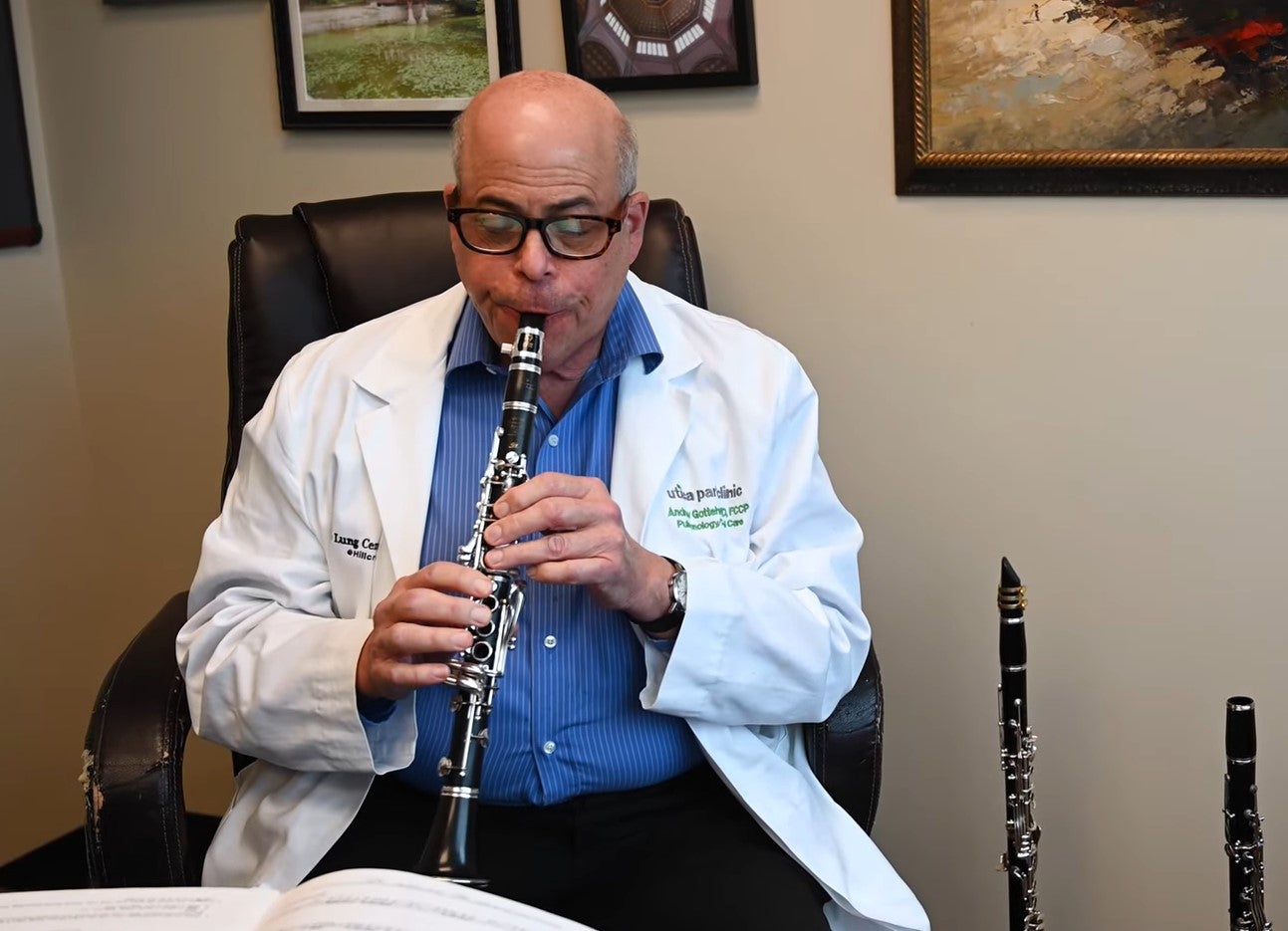Andrew Gottehrer, M.D., is well known for both his expertise in both medicine and music. And it is the correlation between those two fields that has enabled the New York native to achieve perfect harmony.
Gottehrer is board certified in pulmonary and critical care medicine with Utica Park Clinic (UPC). Prior to joining UPC, Gottehrer practiced independently on the Hillcrest Medical Center campus for two decades.
When he’s not treating patients, Gottehrer spends part of his time honing his skills as an accomplished clarinetist. The woodwind instrument was his ticket to perform at Carnegie Hall in high school and later for the New York Philharmonic.
Gottehrer said both his profession and passion share common characteristics.
“Musicians are good at thinking out of the box,” he said. “That’s how my brain works. I think it also makes you a better doctor. People don’t come black and white.”
Gottehrer grew up in a musically inclined, middle-class family in the Big Apple. His father played the trumpet. His sister preferred the oboe and piano while his mother was a part-time opera singer. Captivated by the sights and sounds of “American Bandstand” on television as a youngster, Gottehrer cut his teeth on the piano and trumpet. He chose the clarinet in junior high, a decision inspired by the Mendelssohn Hebrides Overture.
“Once I heard it, I knew I wanted to do that,” he said.
Gottehrer was one of a select few who were chosen for the prestigious High School of Music & Art in New York City. Following high school, Gottehrer decided to pursue medicine, earning his bachelor’s degree at the University of Rochester in Rochester, New York before moving across the country to attend UCLA medical school. After completing his internship and residency in internal medicine, he finished his fellowship in pulmonary and critical care medicine.
Gottehrer moved to the Tulsa area soon after and began his professional career in medicine. All the while he continued to dabble in music.
“It’s my spirit,” Gottehrer. “It’s part of my soul.”
Gottehrer dipped his toe back into the performance arena when he got a call from one of his acquaintances about an opening in the Tulsa community orchestra, which had a need for a piccolo (soprano) clarinet player. Gottehrer has also performed with the Starlight Band, Oklahoma’s only professional concert band that includes more than 50 musicians, an opportunity that allowed him to play at the Guthrie Green.
Gottehrer has performed as a member of the Bartlesville Symphony Orchestra for more than a decade, an opportunity that began when he spoke with the conductor’s wife, a former medical sales professional. He later became the orchestra’s principle clarinet player.
In 2005, former Hillcrest neurosurgeon and the late Frank Letcher reached out to Gottehrer about his desire to reinvent a local symphony after the Tulsa Philharmonic had disbanded. He has continued an association with the organization since that time and, in 2020, Gottehrer helped the Tulsa Symphony made history despite pandemic constraints.
Tulsa Symphony’s performance scheduled had been squelched for much of 2020 due to COVID-19. But, in September, the organization collaborated with Bruce Dart, Ph.D., executive director of the Tulsa Health Department, and other local officials to become the first professional orchestra in the country to perform in front of a live audience since mid-March 2020. Gottehrer and Meredreth Maynard facilitated the musicians to get the COVID vaccines at a Hillcrest facility.
Gottehrer is referred to by his fellow musicians as the unofficial physician for the Tulsa Symphony.
“I just tell them, ‘Don’t call me during the day,’” he said.
The intersection of medicine and music have long played a critical role in Gottehrer’s life, both on a personal level and for those around him.
Several years ago, after being diagnosed with prostate cancer, members of the Tulsa Symphony drove Gottehrer to concerts to help lift his spirits.
“Musicians are the best people,” he said.
Gottehrer had a passing interest in becoming an archeologist or meteorologist when he was younger. Instead, he has mastered the ability to connect notes from sheet music much the same way he has connected with his patients.
“Music always got me out of my shell,” he said. “It’s always helped me to better understand the people I see in my office.”

